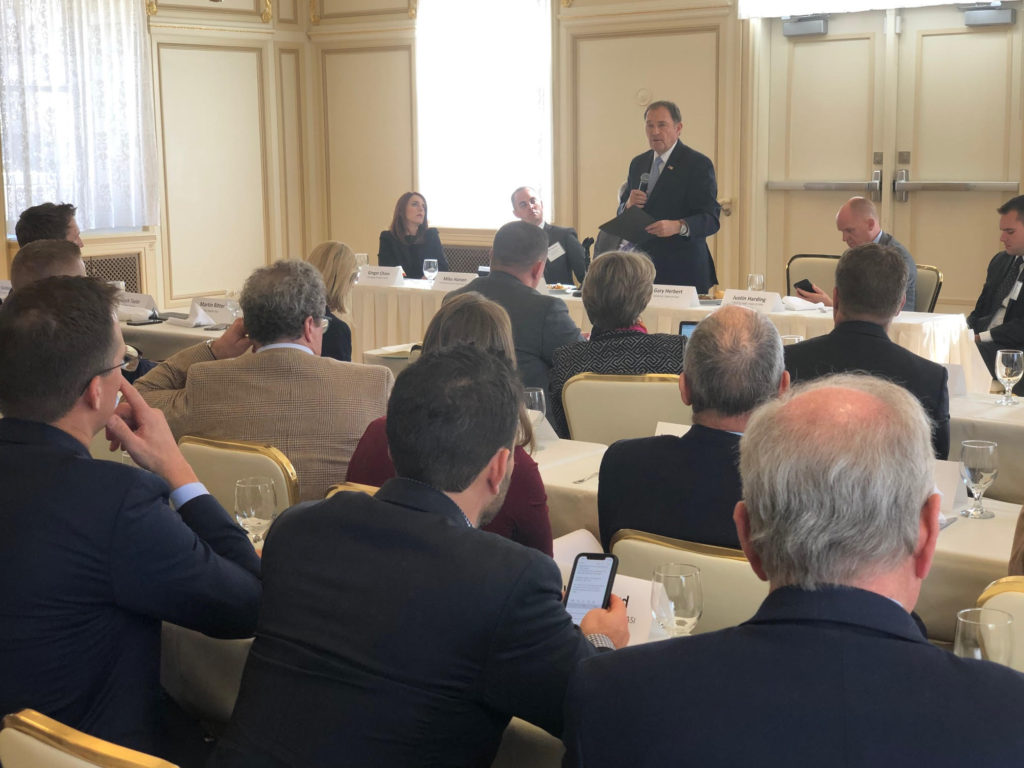Each quarter, Gov. Herbert hosts a roundtable with Utah business leaders. It’s part of a continued effort to meet with and hear from constituents and maintain a focus on strong economic development in Utah. The Governor’s Roundtables are organized by the team at the Utah Governor’s Office of Economic Development.
This month’s roundtable, hosted at the Kem C. Gardner Policy Institute, welcomed more than 45 high-level Utah business executives whose companies do international business. Participants included manufacturers, software and information technology companies, among others.
GOED partners, World Trade Center Utah and EDCUtah, also participated to share resources and information, and to help make connections to meet the needs expressed by the business executives.
GOED Executive Director Val Hale welcomed the group and then invited participants to introduce themselves, share names, titles and the company they represent with attendees. Gov. Herbert provided introductory remarks, sharing highlights of Utah’s economic development successes and commentary on Utah’s and the country’s economies.
Business executives mentioned several challenges they were experiencing and thanked Gov. Herbert for his ongoing support of trade missions. These trade missions help keep Utah top-of-mind in other countries and keep Utah companies connected around the globe.
Topics discussed include:
Welcoming refugees — Gov. Herbert was thanked for his recent effort to invite more refugees to settle in Utah.
Benefit corporations — Several participants noted the importance of their corporate citizenship and the popularity of their available job positions because of their commitment to giving back. Utah’s impressive track record of charitable giving and volunteerism (the state is a leader in the nation) was mentioned alongside the desire to reduce earning gaps and provide economic mobility and opportunity for all Utahns.
Banking overseas — Participants noted the difficulty they are experiencing establishing banking relationships in foreign countries.
Intellectual property — Participants shared concerns related to protecting intellectual property, notably overseas.
The Utah advantage — An executive shared his company, headquartered overseas, plans to grow its Utah operation because of Utah’s educated workforce, the low cost of doing business in Utah and Utah’s physical location and transportation infrastructure.
Apprenticeships — Company representatives thanked the state for its efforts to establish apprenticeships that introduce workers to job opportunities in different fields.
Truck driver shortage — Companies expressed concern with the cost of hiring truck drivers and difficulty in getting materials in and out of the state because of the country’s truck driver shortage.
Commute times — Executives talked about the strain on Utah’s transportation infrastructure and quality of life that increased growth creates. They’re concerned with how much time employees spend commuting.
USMCA (a signed, but not ratified, free trade agreement between Canada, Mexico, and the United States) — Executives noted that trade with Canada and Mexico is critical to their success and encouraged Utah’s ongoing support for the agreement.
Direct flights — Several executives commented direct flights from Salt Lake City International Airport worldwide destinations helps support international business. EDCUtah’s President and CEO, Theresa Foxley, who also serves on an advisory board for the SLC airport, reported there’s a possibility Delta could announce a direct flight to Asia in the coming months.
Appreciation — Finally, an executive talked about their experience in a neighboring state, and praised Utah for its business-friendly environment. They were pleasantly surprised by how accessible Gov. Herbert and his administration have been, as exemplified by the open roundtable discussion.

